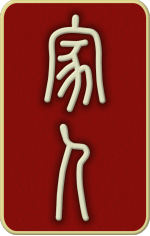
家人 Jiā rén Home (Domesticity) [hexagram 37]


Wind/Wood over Fire
 Wood element
Wood element
Lunar month: 5 ; Host (controlling) line : 2
The Decision
Home – rewarding for the partner to be steadfast.
Home. One is in the proper inner place, the other in the outer. Appropriate places resonate with Heaven and Earth. In the home parents rule. When father acts as father, son as son; when the elder brother acts as elder brother and the younger brother as younger brother, when the husband act as husband and wife as wife then the home is in its appropriate state. Institute the family appropriately and then all is on a firm foundation.
家人: 利女贞. Jiā rén: lì nǚ zhēn.
彖传: 家人, 女正位乎内, 男正位乎外, 男女正, 天地之大义也. 家人有严君焉, 父母之谓也. 父父, 子子, 兄兄, 弟弟, 夫夫, 妇妇, 而家道正; 正家而天下定矣. Tuàn zhuàn: Jiā rén, nǚ zhèng wèi hū nèi, nán zhèng wèi hū wài, nán nǚ zhèng, tiān dì zhī dà yì yě. Jiā rén yǒu yán jūn yān, fù mǔ zhī wèi yě. Fù fù, zǐ zǐ, xiōng xiōng, dì di, fū fū, fù fù, ér jiā dào zhèng; zhèng jiā ér tiān xià dìng yǐ.
The Image
Fire creates Wind and together form ‘Home’. The wise accordingly speak meaningfully and act consistently.
象传: 风自火出, 家人; 君子以言有物, 而行有恒. Xiàng zhuàn: Fēng zì huǒ chū, jiā rén; jūn zǐ yǐ yán yǒu wù, ér xíng yǒu héng.
Line Change 1
Imposing household rules – regrets dissolve away.
‘Imposing household rules’ – set early boundaries.
初九: 闲有家, 悔亡. Chū jiǔ: xián yǒu jiā, huǐ wáng.
象传: 闲有家, 志未变也. Xiàng zhuàn: Xián yǒu jiā, zhì wèi biàn yě.
Line Change 2
Taking on no extra responsibilities, concentrating on preparing meals within. Perseverance brings good fortune.
The good fortune stems from gentleness and humility.
六二: 无攸遂, 在中馈, 贞吉. Liù èr: wú yōu suì, zài zhōng kuì, zhēn jí.
象传: 六二之吉, 顺以巽也. Xiàng zhuàn: Liù èr zhī jí, shùn yǐ xùn yě.
Line Change 3
Discontent in the household met with sternness. Regrets as there is jeopardy, yet soon all will be well; however, if partner and children mock and smirk then disgrace.
‘Discontent in the household met with sternness’ – not yet a major concern. ‘However, if wife and children mock and smirk’ – the harmony of the family has been lost.
九三: 家人嗃嗃, 悔厉吉; 妇子嘻嘻, 终吝. Jiǔ sān: jiā rén hè hè, huǐ lì jí; fù zǐ xī xī, zhōng lìn.
象传: 家人嗃嗃, 未失也; 妇子嘻嘻, 失家节也. Xiàng zhuàn: Jiā rén hè hè, wèi shī yě; fù zǐ xī xī, shī jiā jié yě.
Line Change 4
Enriching the home. Very promising.
‘Enriching the home. Very promising’ – acceptance is correctly placed.
六四: 富家, 大吉. Liù sì: fù jiā, dà jí.
象传: 富家大吉, 顺在位也. Xiàng zhuàn: Fù jiā dà jí, shùn zài wèi yě.
Line Change 5
The leader influences the household. No need for concern as it is fortunate.
‘The leader influences the household’ – sharing mutual affection.
九五: 王假有家, 勿恤, 往吉. Jiǔ wǔ: wáng jiǎ yǒu jiā, wù xù, wǎng jí.
象传: 王假有家, 交相爱也. Xiàng zhuàn: Wáng jiǎ yǒu jiā, jiāo xiāng ài yě.
Line Change 6
Sincere and majestic. The eventual outcome will be favorable.
The good fortune from being majestic comes from nurturing the inner character.
上九: 有孚威如, 终吉. Shàng jiǔ: yǒu fú wēi rú, zhōng jí.
象传: 威如之吉, 反身之谓也. Xiàng zhuàn: Wēi rú zhī jí, fǎn shēn zhī wèi yě.
The full set of 64 English translations is available in our new book 'Book of Changes - Deciphered' ➚.